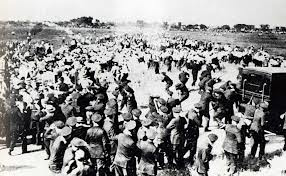The Elaine
Race Riot, also called the Elaine Massacre, occurred September 30, 1919 in
the town of Elaine in Phillips County, Arkansas,
in the Arkansas Delta,
where sharecropping by African
American farmers was prevalent on plantations of
white landowners.
Approximately
100 African-American farmers,
led by Robert L. Hill,
the founder of the Progressive
Farmers and Household Union of America, met at a church
in Hoop Spur in Phillips County,
nearby Elaine.
The
purpose was "to obtain better payments for their cotton crops from
the white plantation owners who
dominated the area during the Jim
Crow era.
Black sharecroppers were often
exploited in their efforts to collect payment for their cotton crops."
The
Elaine Massacre was by far the deadliest racial
confrontation in Arkansas history and possibly
the bloodiest racial conflict in the history of the United States. While its
deepest roots lay in the state’s commitment to white supremacy, the events in
Elaine stemmed from tense race relations and growing concerns about labor
unions.
In
previous months, racial conflict had occurred in numerous cities in America,
including Washington DC; Chicago, Illinois; Knoxville, Tennessee; and
Indianapolis, Indiana.
With
labor conflicts escalating throughout the country at the end of World
War I, government and business interpreted the demands of
labor increasingly as the work of foreign ideologies, such as Bolshevism, that
threatened the foundation of the American economy.
Thrown
into this highly combustible mix was the return to the United States of black
soldiers who often exhibited a less submissive attitude within the Jim Crow
society around them.
Evidence
shows that the mobs of whites slaughtered African Americans in and around
Elaine. For example, H. F. Smiddy, one of the white witnesses to the massacre,
swore in an eye-witness account in 1921 that “several hundred of them… began to
hunt negroes and shotting [sic] them as they came to them.”
Anecdotal
evidence also suggests that the troops from Camp Pike engaged in indiscriminate
killing of African Americans in the area, which, if true, was a replication of
past militia activity to put down perceived black revolts.
In
1925, Sharpe Dunaway, an employee of the Arkansas
Gazette, alleged that soldiers in Elaine had “committed one
murder after another with all the calm deliberation in the world, either too
heartless to realize the enormity of their crimes, or too drunk on moonshine to
give a continental darn.”
The
white leaders put forward their view that black residents had been about to
revolt. E. M. Allen, a planter and real estate developer who became the
spokesman for Phillips County's white power structure, told the Helena
World on October 7, “The present trouble with the Negroes in Phillips
County is not a race riot.
It
is a deliberately planned insurrection of the Negroes against the whites
directed by an organization known as the ‘Progressive Farmers and Household
Union of America,’ established for the purpose of banding Negroes together for
the killing of white people.”
It
is times like this that
I am ashamed of
my Caucasian heritage.




No comments:
Post a Comment